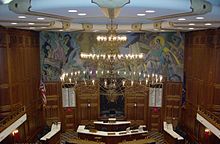Indiana House of Representatives
| Indiana House of Representatives | |
|---|---|
| Indiana General Assembly | |
 |
|
| Type | |
| Type | |
|
Term limits
|
None |
| History | |
|
New session started
|
January 6, 2015 |
| Leadership | |
|
Majority Leader
|
Matthew Lehman (R)
Since October 6, 2015 |
|
Minority Leader
|
|
| Structure | |
| Seats | 100 |
 |
|
|
Political groups
|
Governing party
Opposition party
|
|
Length of term
|
2 years |
| Authority | Article 4, Indiana Constitution |
| Salary | $22,616.46/year + per diem |
| Elections | |
|
Last election
|
November 4, 2014 (100 seats) |
|
Next election
|
November 8, 2016 (100 seats) |
| Redistricting | Legislative Control |
| Meeting place | |
 |
|
|
House of Representatives Chamber Indiana Statehouse Indianapolis, Indiana |
|
| Website | |
| Indiana General Assembly | |
Coordinates: 38°46′7.54″N 86°9′45.54″W / 38.7687611°N 86.1626500°W
Governing party
Opposition party
The Indiana House of Representatives is the lower house of the Indiana General Assembly, the state legislature of the United States state of Indiana. The House is composed of 100 members representing an equal number of constituent districts. House members serve two-year terms without term limits. According to the 2010 census, each State House district contains an average of 64,838 people.
The House convenes at the Indiana Statehouse in Indianapolis.
In order to run for a seat for the Indiana House of Representatives one must be at least 21 years of age upon taking office, be a citizen of the United States, have resided in the state of Indiana for 7 years, and in the district to represent for at least 1 year.
Representatives serve terms of two years, and there is no limit on the number of terms a representative may serve.
†Member was initially appointed to the seat.
The Indiana House of Representatives held its first session in the first statehouse in the original state capital of Corydon and the first speaker of the body was Isaac Blackford. Under the terms of the constitution of 1816, state representatives served one years terms, meaning elections were held annually. In 1851, the constitution was replaced by the current constitution and terms were lengthened to two years, but sessions were held biennially. A 1972 constitutional amendment allowed for a short legislative session to be held in odd numbered years.
...
Wikipedia

